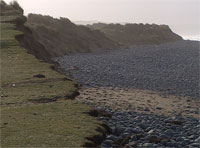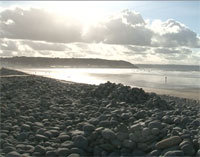Biosphere Reserves: Rising Tides

- © UNESCO
- Shore Erosion, Devon
Climate change is driving sea-level rise and creating a dilemma for coastal communities all over the world. The BBC World News ‘Earth Report’ series travels to the UK and Kenya to see if UNESCO ‘biosphere reserves’ provide answers.
The BBC documentary investigates how two ‘twinned’ coastal biosphere reserves, one in the UK and one in Kenya are comparing their mutual challenges and sharing the lessons learnt in trying to find sustainable solutions to local development in the face of climate change. The ‘twinning’ has taken place within the framework of the UNESCO World Network of Biosphere Reserves which includes 531 biosphere reserves in 105 countries.
Braunton Burrows is one of the UK’s Biosphere Reserves – it’s a living laboratory for people and nature where conservation, sustainable development and scientific research go hand in hand. Here, climate change will affect local industries such as tourism, fishing.
In Malindi Watamu, Braunton Burrow’s twin biosphere reserve in Kenya, coral reefs used by artisan fishers are under threat which means loss of vital protein in the diet of poor families. Without planning, encroaching development on beaches together with the impact of sea level rise will impact on internationally important turtle habitats.

The teams in Africa and UK are exchanging scientific knowledge, and encouraging stakeholder participation to address these pressures on the "life support systems" of the two areas. The scientists hope that the computer model, programmed with relevant data, will help map climate change scenarios in both Kenya and the UK and will help develop adaptation strategies for the future.
Central to the message of the programme is the notion of sustainable development. How can local communities work with planners and decision-makers to find optimal solutions for the future? What have these two biosphere reserves done together and what will they do in the future?
Building on the experience of twinning a UNESCO biosphere reserve from the northern hemisphere with one in the south, a deeper review of the collaboration and collective learning achieved through the World Network of Biosphere Reserves will be explored in this programme demonstrating some of the key benefits that UNESCO designated sites can bring.
BBC World News broadcasts Rising Tides at the following (GMT)times:
Friday 6 March at 20:30; Tuesday 10 March at 15:30; Wednesday 11 March at 02:30.
Related links:
:: UNESCO Biosphere Reserves Programme (More)
:: UNESCO and Global Climate Change (More)
:: Press Release (More)
:: Clip on TVE website : YouTube (More)
- Source:UNESCO SC
- 06-03-2009
- © UNESCO - Pebble Beach, Devon

